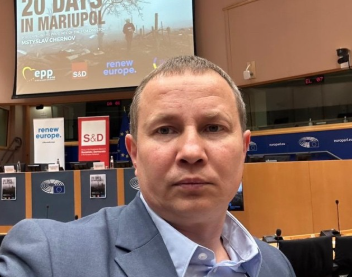The Siege of Mariupol and Mykola's Escape
Mariupol was one of the first targets of Russian military forces, enduring a devastating siege that caused immense harm to its inhabitants. The siege lasted until May 20, 2022, when the last Ukrainian soldiers in the city were forced to surrender. The city was heavily damaged, and Mykola was not spared this tragedy. On February 24, his birthday, his home was bombed and destroyed. He lost his brother and mother. Forced to flee, he had to leave his home, never to return.
Mykola and his family initially sought found refuge with friends, but their homes were also destroyed one by one. Forced to flee again, Mykola and his family wandered for 21 days, a period he describes as extremely difficult: "There was the constant fear of dying and the impossibility of escaping."
In the absence of humanitarian corridors or organized evacuations, they finally left Mariupol by car, crossing Russian territory, the only possible way out from the eastern part of the city. On their journey, they were frequently questioned by the police and the FSB before eventually arriving in Georgia, where they stayed with friends for several weeks.
The family then moved to Italy, where Mykola's wife had studied. She was able to find a job, but Mykola was not so lucky. He explains that many Ukrainians in Italy struggled to find work, not just because of the language barrier, but mainly due to stereotypes that increase discrimination against refugees. So they left Italy to settle in Utrecht in the Netherlands after hearing about various migrant integration programs set up by local authorities.
Life in Limbo: The Struggles and Uncertainties Faced by Ukrainian Refugees in Europe
Settling in Utrecht: A New Beginning
Today, Mykola and his family have no ties left to Mariupol. Mykola is now thriving in his role as an international advisor at the Utrecht municipality, while his wife has found a job at a local university, and their son attends a Dutch school.
While Mykola’s story is poignant, it doesn't reflect the experience of all Ukrainian refugees in Europe. Many are constantly questioning their future: Should they return to Ukraine? Should they settle in their host country? How long will the war last?
This uncertainty is driven by two main factors according to Mykola:
Challenges of Misinformation and Integration
As they seek safety and stability, Ukrainian refugees face the harmful effects of misinformation, which distorts their understanding of the real situation in their home country. This confusion makes it harder for them to make informed decisions about their future. False reports about safety in Ukraine and the progress of the conflict influence their decisions about their return. Moreover, propaganda fuels negative stereotypes against Ukrainian refugees, portraying them as economic burdens or cultural threats. These perceptions lead to discrimination and xenophobia, making it harder for refugees to integrate into their host societies and access essential services.
Temporary Protection and Its Implications
Since March 2022, Ukrainians have enjoyed a special status know as temporary protection within the European Union. This status has been extended multiple times and could last until 2026 if the conflict continues. However, this temporary situation limits their access to stable employment and housing. Some employers and landlords are reluctant to take on people with temporary residency status, increasing their dependence on social assistance and the risk of poverty and social exclusion. Additionally, the lack of a long-term perspective makes it difficult for them to plan their future, hindering their full integration into European societies, access to education, and the development of professional projects.
3. Rebuilding and Revitalizing: Mykola's Role in Utrecht and the Ambitious Mariupol Reborn Initiative
Mykola's Role in Utrecht and Future Prospects
Mykola plans to stay in Utrecht, where he currently works as an International Advisor for Grants and Funds in the Strategy, Investments, and Funds department of the Utrecht Municipality. In this capacity, he plays a crucial role in preparing and implementing projects that receive European funding. Mykola is particularly focused on initiatives that aid Ukrainian refugees and support the reconstruction of Ukraine, with a strong emphasis on the ambitious Mariupol Reborn project.
4. Mariupol Reborn: A Vision for the Future
Mariupol Reborn is a comprehensive initiative led by the Mariupol City Council to rebuild the Ukrainian city after the war.,
The project follows a six-stage process: drafting a visual plan for the city's future; developing a Fast Recovery Plan to speed up reconstruction and revitalization once the city is liberated; assessing the damage, creating a financial and economic model, and crafting a comprehensive city revival strategy. Finally, a master plan will be developed by 2040, incorporating all these elements.
The City Council collaborates with international organizations such as the European Bank for Reconstruction and Development (EBRD) and USAID, as well as European cities experienced in urban renewal and Ukrainian businesses. Public input is a priority, with "MeMariupol" centers facilitating citizen discussions on the city's future, and dialogue sessions titled "I am Mariupol: I intend to revive" allowing residents to contribute directly.
Mariupol Reborn is an ambitious effort not just to rebuild but to transform Mariupol into a symbol of hope and Ukrainian resilience, involving both community and international expertise to create a model for post-war recovery.
Conclusion
Mykola's journey from Mariupol to Utrecht shows the resilience and determination of those displaced by conflict. His story highlights the personal toll of the war while also emphasizing the broader struggles faced by Ukrainian refugees across Europe. Despite the challenges of misinformation, discrimination, and the uncertainties of temporary protection, Mykola has managed to rebuild his life and contribute to the future of both his host city and his homeland. The Mariupol Reborn initiative symbolizes the hope and vision for a future where cities like Mariupol can rise from the ashes, serving as beacons of recovery and renewal.
To learn more about the Mariupol Reborn project, click here: United Urban Vision | Mariupol Reborn (remariupol.com)

Written by Sofiane Youssef

